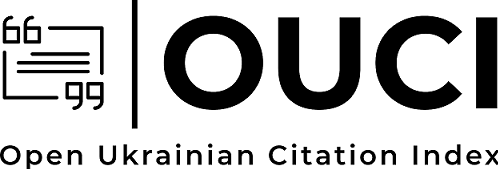НАЦІОНАЛЬНА БЕЗПЕКА УКРАЇНИ В КОНТЕКСТІ ПРОБЛЕМ ТРАНСПОРТНО-ЕНЕРГЕТИЧНОЇ СПІВПРАЦІ З АЗЕРБАЙДЖАНОМ НА МЕЖІ ХХ–ХХІ ст.
DOI:
https://doi.org/10.28925/2524-0757.2016.1.6Ключові слова:
національна безпека, транспортно-енергетична сфера, нафтопроводи, іноземні інвестиції, співробітництвоАнотація
У статті висвітлено недоліки національної безпеки України на прикладі виникнення проблем у розвитку українсько-азербайджанської співпраці в транспортно-енергетичній сфері.
Завантаження
Посилання
Gasymly M.Dzh. Ukrainsko-azerbaydzhanskiye politicheskiye otnosheniya: istoriya i sovremennost / M.Dzh. Gasymly, O.R. Kupchik, A.U. Damirov. — Yzd. 2-e, ispr. i dop. — Kiyev : Izd. dom D. Burago, 2014. — 154 c. — rus.
Dvostoronni vidnosyny Ukrainy z krainamy SND. V kn. Heopolityka : Ukraina v mizhnarodnykh vidnosynakh [Elektronnyy resurs] // Biblioteka onlayn 2006–2014. — Rezhym dostupu : http: // www.readbookz.com/book/183/6470.html. — Nazva z ekranа.
Dohovir pro druzhbu, spivrobitnytstvo i partnerstvo mizh Ukrainoiu i Azerbaydzhanskoiu Respublikoiu [Elektronnyy resurs] // Verkhovna Rada Ukrainy 1994–2015. — Rezhym dostupu : http: // www. zakon5.rada.gov.ua/laws/show/031_025
Zamiatin V. Taliat Aliiev: Ukraini v Azerbaydzhani treba pratsiuvaty na vyperedzhennia [intervyu] / V. Zamiatin [Elektronnyy resurs] // Den. — Rezhym dostupu : http: // www.day.kiev.ua/66191
Kim Yu. Ukraina-Azerbaydzhan: istoriia mizhderzhavnykh znosyn / Yu. Kim // Ukraina-Azerbaydzhan: Khronika 2000. — Kyiv : Feniks, 2011. — S. 103–108.
Koruptsiyne dosie rezhymu. Sprava №1. Revers Odesa–Brody [Elektronnyy resurs]. — Rezhym dostupu : http: // www. board.teremki.net.ua/lofi version/index.php/t1858.htl]
Mamed-Zade N.S.K. Vzaimootnosheniya Azerbaydzhanskoy Respubliki so slavyanskimi stranami SNG i Vostochnoy Evropy / N.S.K. Mamed-Zade. — [Elektronnyiy resurs]. — Baku, 2006. — 145 s. — Rezhim dostupa : http://www.anl.az/el/m/mn_vaps.pdf
Naumenko M.I. Ukrainsko-azerbaidzhanski vidnosyny na suchasnomu etapi (1991–2010 rr.) : avtoref. dys. ... kand. ist. nauk : 07.00.02 / M.I. Naumenko ; Kyiv. slavist. un-t. — Kyiv, 2013. — 19 c.
Polovetska V. Azerbaidzhanskyi «aktsent» v ekonomitsi Ukrainy / V. Polovetska [Elektronnyy resurs] // Dzerkalo tyzhnya. — 2002. — № 17. — 10 travnia. — Rezhym dostupu : http://gazeta.dt.ua.
Posol Azerbaidzhanskoi Respubliky Taliat Aliev: «Nashi krainy maiut velykyi potentsial dlia rozvytku vzaiemovyhidnykh dvostoronnikh torhovelno-ekonomichnykh vidnosyn» [Elektronnyy resurs] // Krainy svitu. Azerbaydzhan. — Rezhym dostupu : :http: // www. svit.ukrinform.ua
Tryhub P.M. Ukrainsko-azerbaidzhanski ekonomchni vidnosyny: tendentsii rozvytku / P.M. Tryhub [Elektronnyy resurs] // Scientifi cworld. — Rezhym dostupu : http: // www.sworld.com.ua/index.php/uk/history-313/world-history-and-the-history-of-ukraine-313/18487-313-0414
Uhoda mizh Ukrayinoiu i Azerbaidzhanskoiu Respublikoiu pro vstanovlennia dyplomatychnykh vidnosyn (u formi obminu notamy) [Elektronnyy resurs] // Verkhovna Rada Ukrainy 1994–2015. — Rezhym dostupu : http: // www.zakon3.rada.gov.ua/laws/show/031_005
Ukraina na mizhnarodniy areni : U 2-kh kn. : zbirnyk dokumentiv i materialiv, 1996–2000 rr. Kn. 1. — Kyiv : Yurinkom Inter, 2003. — S. 556.
Umarova N.N. Ukrainsko-azerbaidzhanski vidnosyny v enerhetychniy sferi [Elektronnyy resurs] // Hromadskyi sait istorychnoho fakultetu MDU. — Rezhym dostupu : http://istfak.org.ua.
Shahbazov Ye.G. Perspektivy razvitiya strategicheskogo partnerstva: neft yanaya i gazovaya promyshlennost Azerbaydzhana v nachale XXI veka / Ye.G. Shahbazov // Materialy Mizhnarodnoi naukovo-praktychnoi konferentsii «Azerbaidzhan—Ukraina: perspektyvy rozvytku stratehichnoho partnerstva» ; Farida Ahazade (uporiad.), Arif Huliiev (uporiad.). — Kharkiv : FORT, 2003. — S. 106–111.
Yanukovich poruchil otdat «Odessa—Brody» rossiyanam? [Elektronniy resurs] // Ukrainskaya pravda. — Rezhim dostupa : http://www.pravda.com.ua
Yunusov A. Azerbaydzhan v nachale XXI veka: konfl ikty i potentsialnyie ugrozy / A. Yunusov. — Baku : Adilogly, 2007. — 276 c.
Опубліковано
Як цитувати
Номер
Розділ
Ліцензія
Авторське право (c) 2016 Київські історичні студії

Ця робота ліцензується відповідно до Creative Commons Attribution-NonCommercial-ShareAlike 4.0 International License.
Автори, які публікуються у цьому журналі, залишають за собою право на авторство своєї роботи та передають журналу право першої публікації цієї роботи на умовах публічної ліцензії Creative Commons: Attribution-NonCommercial-ShareAlike 4.0 International (CC BY-NC-SA 4.0), котра дозволяє іншим особам вільно розповсюджувати опубліковану роботу з обов'язковим посиланням на авторів оригінальної роботи та першу публікацію роботи у цьому журналі.














